Grand sendoff for 10th graduating class
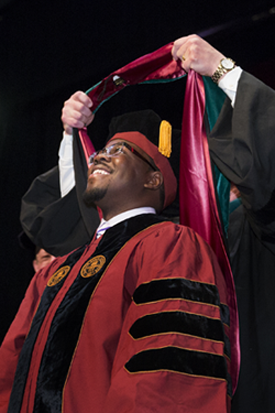
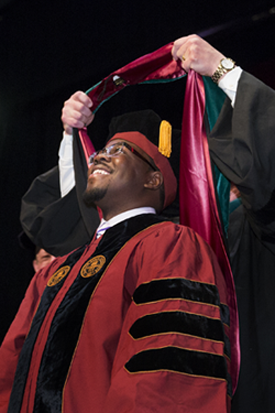
May 17, 2014
By Ron Hartung
Saturday’s commencement ceremony for the College of Medicine’s Class of 2014 featured a number of firsts:
- The first alumni hooding sibling graduates.
- The first alumnus hooding his wife.
- The first selfie taken onstage immediately after hooding.
- The first Honors Medical Scholars graduating from the College of Medicine.
- The first grad crossing the stage with his right knee resting on a wheeled support because his foot was bandaged.
- The first time we’ve named a Professor Emeritus.
- The first time we’ve had a whopping 12 military graduates — and incorporated their promotion into the graduation ceremony.
- And the first time a grad has been unable to attend because his family was threatened first by floods and then by fires.
“You have become the exemplary physicians that we hoped you would be,” Dean John Fogarty told the 115 graduates at the start of the two-hour ceremony. “I am very proud of each and every one of you.”
This was the College of Medicine’s 10th graduating class, and the med school’s total number of alumni now stands at 795.
This class was a model of diversity, Fogarty noted. A quarter of the graduates came from backgrounds identified as underrepresented in medicine. Its enrollment of Hispanic students was triple the national average for U.S. medical schools. And this year, as in the past four years, the College of Medicine ranked above the 90th percentile nationwide in producing black or African-American graduates.
Fogarty also praised the Class of 2014’s commitment to service: “Almost one-third of your class did global health work — Nicaragua, Panama, Haiti, Ecuador, Mexico and Ghana … more than any other class in our history. Your long-term work in Nicaragua and Panama has built relationships that will last long past your graduation.”
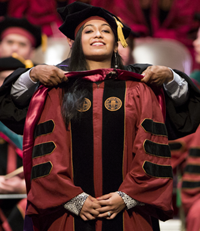 Add to that the caliber of these students’ academic work, he said, and it’s no surprise that they were snatched up by outstanding residency programs.
Add to that the caliber of these students’ academic work, he said, and it’s no surprise that they were snatched up by outstanding residency programs.
“You matched at these programs both because of your incredible accomplishments and the reputation of this young school to produce wonderful graduates,” Fogarty said. “Show them what you learned by how you act and treat your future patients. I’ve been told by hospital executives that they can pick out an FSU College of Medicine student.”
Commencement speaker Lynn Romrell, associate dean for medical education and longtime anatomy teacher, had been selected by the students themselves. Known as the college’s official statistician, he offered the graduates three numbers to ponder:
- 1,443 — the number of days they were in medical school.
- 133 — the number of exams, quizzes and other tests they endured.
- 1,003 — the average number of patient encounters they were privileged to have.
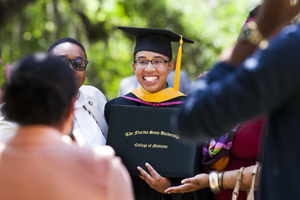 Class President Brett Thomas got a standing ovation for his 10-minute reflection on the past four years. (Read his op-ed on rural health.) This was a poignant passage: “We ultimately learned that a ‘good pathological case’ always came with a price. Sometimes it was a left-behind elderly spouse or a stroke survivor, once a social butterfly, now unable to speak. Somewhere during our third and fourth years, we began to understand the weight of the responsibility we’d soon be carrying. But if not for these experiences, we wouldn’t have received clarity on our specialty choice, met our match or gained the experience to care for our future patients.”
Class President Brett Thomas got a standing ovation for his 10-minute reflection on the past four years. (Read his op-ed on rural health.) This was a poignant passage: “We ultimately learned that a ‘good pathological case’ always came with a price. Sometimes it was a left-behind elderly spouse or a stroke survivor, once a social butterfly, now unable to speak. Somewhere during our third and fourth years, we began to understand the weight of the responsibility we’d soon be carrying. But if not for these experiences, we wouldn’t have received clarity on our specialty choice, met our match or gained the experience to care for our future patients.”
Amid all the garnet caps and gowns were a dozen graduates dressed in black. Those were the master’s students graduating from the Bridge Program. (Read about their masters projects.) Ten days later, they’ll be back in school — this time as members of the College of Medicine’s Class of 2018.
Now, back to those “firsts”:
- The siblings were Zarna Dahya (M.D., ’11) hooding brother Vishal; Luis Hernandez (M.D., ’09) hooding brother Lorenzo; and Brandon Mauldin (M.D., ’12) hooding brother Justin. “There can be no better recommendation for a med school,” Fogarty said, “than to have a student or graduate encourage their sibling to follow them to FSU.”
- Souhail Karram (M.D., ’13) hooded his wife, Mariana Borges Karram.
- The Hernandez brothers, mentioned above, took that selfie.
- The Honors Medical Scholars were Keerti Dantuluri, Joe Hernandez and Judy Lin.
- Sam Borelli had the bandaged foot. He needed a procedure and wanted to get it taken care of before he begins his residency.
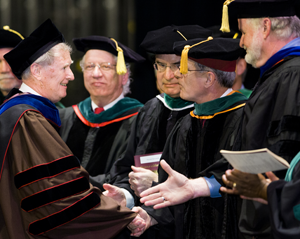 Charlie Ouimet, Ph.D., in Biomedical Sciences, received the Professor Emeritus honor.
Charlie Ouimet, Ph.D., in Biomedical Sciences, received the Professor Emeritus honor.- Ten of the 12 military graduates were on hand, and they got perhaps the loudest ovation of the morning when they marched onstage in uniform. (See the names of all 12 below.
- One of the military grads who couldn’t attend has had a recent string of bad, bad luck. Jimmy Westbrook, a former Navy helicopter pilot, was flooded out of his Pensacola rental home — but not before he managed to save his neighbors from the fast-rising water. (Read the complete story.) Afterward he, his wife and their two kids moved earlier than they’d planned to Southern California — where he’ll be in Camp Pendleton’s family medicine residency program. He had plane tickets to Tallahassee and had planned to attend graduation. “Unfortunately,” he wrote in an email Thursday, “these fires on Camp Pendleton are not well contained, and I am unable to leave my family for graduation in the midst of another potential crisis. We are staying real with relatives who live in a safe zone. At this time, our house is fine but the fire on the base has consumed 6,000 acres and is only 20 percent contained. I'm sorry to miss graduation, but obviously this takes priority. We will be watching online and cheering on my fellow classmates as they get their diplomas.”
Amarateedha Prak, one of his classmates from the Pensacola Regional Campus, made sure he wasn’t forgotten. She carried a life-size photo of his face and frequently waved it over her head.
CLASS OF 2014 HONOREES
COLLEGE OF MEDICINE AWARDS
- J. Ocie Harris Outstanding Student Award (“the best all-around promise of becoming a physician of the highest caliber”):
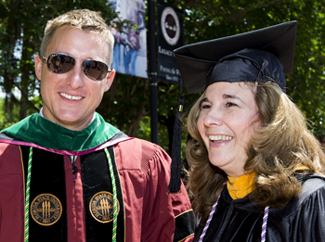 Colin Swigler
Colin Swigler - Myra M. Hurt Leadership in Medicine Award (“exemplary leadership in one or more areas of medicine”): Brett Thomas
- Altruism in Medicine Award (“embodies the highest ideals of medicine as a service calling”): Angela Green-Guzman
- Student Research Award: Joshua Claunch and James Pilkington
- Excellence in Surgery Award: Matthew Welsh
- Access to Care Award (“strong interest in providing access to health care for underserved populations,” given in honor of We Care Network coordinator Robin McDougall): Naomi
Salz Flock - Mission Award (“distinguished himself/herself by activities that further the College of Medicine’s mission”): J.D. Byrd
HONOR SOCIETY AND SPECIALTY AWARDS
- Excellence in Emergency Medicine Award: Ann Sheddan
- Internal Medicine Award: J.D. Byrd
- Florida Geriatrics Society Award for Outstanding Student in Geriatrics: Mary O’Meara and Brett Thomas
- American Medical Women’s Association Glasgow-Rubin Achievement Citation (“women graduates in the top 10 percent of their graduating class”): Tara Fritze, Mia Klein, Li Li, Judy Lin, Kaitlin Love and Ann Sheddan
- American Medical Women’s Association Outstanding Female Graduate: Judy Lin
- Outstanding Graduate in Family Medicine Award: Brett Thomas
- Medical Student Professionalism and Service Award (presented by the American College of Emergency Physicians for “outstanding patient care and involvement in medical organizations and the community”): Matt Heimann
- Merritt Ryals Clements, M.D., Award for Excellence in Obstetrics and Gynecology (“best demonstrated dedication to the health of women”): Megan McDowell
- The American Congress of Obstetricians & Gynecologists District XII 2014 Outstanding Medical Student Achievement Award (“to outstanding medical school graduates entering an obstetrics and gynecology residency program”): Angela Green-Guzman and Kimberly Manek
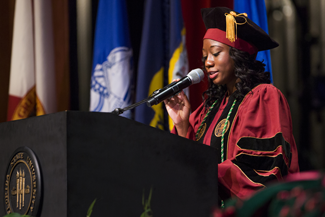 Excellence in Pediatrics Award: Matthew Clark
Excellence in Pediatrics Award: Matthew Clark- Psychiatry Award (presented by North Central Florida Council of American Academy of Child and Adolescent Psychiatry): Joshua Claunch
- Clerkship Directors Psychiatry Award: Ankita Patel
- Alpha Omega Alpha Honor Medical Society inductees (the only national honor medical society): Matthew Clark, Tara Fritze, Alexander Gaukhman, Angela Green-Guzman, Matt Heimann, Anthony Herzog, Kevin Himschoot, Mia Klein, Patrick Kuhlman, Li Li, Judy Lin, James Pilkington, Sweta Sengupta, Ann Sheddan, Jessica Specht, Colin Swigler, Brett Thomas, Matthew Welsh and Zachary Williamson (Faculty electee: Ken Brummel-Smith, M.D.)
- Gold Humanism Honor Society inductees (“excellence in clinical care, leadership, compassion, and dedication to service”): J.D. Byrd, Matthew Clark, Keerti Dantuluri, Naomi Salz Flock, Angela Green-Guzman, Matt Heimann, Mia Klein, Judy Lin, Ann Sheddan, Richard Sims, Jessica Specht, Colin Swigler, Brett Thomas, John Thomas and Matthew Welsh (Faculty inductees: Nancy Baker, M.D., and Pamela Carbiener, M.D.)
REGIONAL CAMPUS AWARDS
Regional Campus Dean’s Award (for “the most outstanding student at each College of Medicine regional campus”):
- Matthew Clark (Daytona Beach)
- Ann Sheddan (Fort Pierce)
- Matthew Welsh (Orlando)
- Naomi Salz Flock (Pensacola)
- Colin Swigler (Sarasota)
- Patrick Kuhlman (Tallahassee)
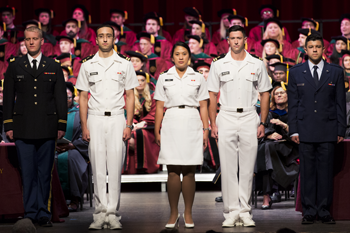
MILITARY PINNING CEREMONY
Promotion in rank for students in the armed services:
- Army — Gerald Bieniek, Josh Ellis, Alicia Evans, Camilo Fernandez-Salvador and Eric Heppner
- Navy — Jason Pesqueira, Teedha Prak, Jimmy Westbrook and Ryan Williamson
- Air Force — Kevin Carnevale, Kevin Dietrich and Alex Nguyen
SUMMARY OF STUDENT HONOREES (in alphabetical order)
- J.D. Byrd (Mission Award, Internal Medicine Award, Gold Humanism Honor Society)
- Matthew Clark (Excellence in Pediatrics Award, Regional Campus Dean’s Award (Daytona Beach), Alpha Omega Alpha Honor Medical Society, Gold Humanism Honor Society)
- Joshua Claunch (Student Research Award, Psychiatry Award)
- Keerti Dantuluri (Gold Humanism Honor Society)
- Naomi Salz Flock (Access to Care Award, Regional Campus Dean’s Award (Pensacola), Gold Humanism Honor Society)
- Tara Fritze (American Medical Women’s Association Glasgow-Rubin Achievement Citation, Alpha Omega Alpha Honor Medical Society)
- Alexander Gaukhman (Alpha Omega Alpha Honor Medical Society)
- Angela Green-Guzman (Altruism in Medicine Award, The American Congress of Obstetricians & Gynecologists District XII 2014 Outstanding Medical Student Achievement Award, Alpha Omega Alpha Honor Medical Society, Gold Humanism Honor Society)
- Matt Heimann (Medical Student Professionalism and Service Award, Alpha Omega Alpha Honor Medical Society, Gold Humanism Honor Society)
- Anthony Herzog (Alpha Omega Alpha Honor Medical Society)
- Kevin Himschoot (Alpha Omega Alpha Honor Medical Society)
- Mia Klein (American Medical Women’s Association Glasgow-Rubin Achievement Citation, Alpha Omega Alpha Honor Medical Society, Gold Humanism Honor Society)
- Patrick Kuhlman (Regional Campus Dean’s Award (Tallahassee), Alpha Omega Alpha Honor Medical Society)
- Li Li (American Medical Women’s Association Glasgow-Rubin Achievement Citation, Alpha Omega Alpha Honor Medical Society)
- Judy Lin (American Medical Women’s Association Outstanding Female Graduate, American Medical Women’s Association Glasgow-Rubin Achievement Citation, Alpha Omega Alpha Honor Medical Society, Gold Humanism Honor Society)
- Kaitlin Love (American Medical Women’s Association Glasgow-Rubin Achievement Citation)
- Kimberly Manek (The American Congress of Obstetricians & Gynecologists District XII 2014 Outstanding Medical Student Achievement Award)
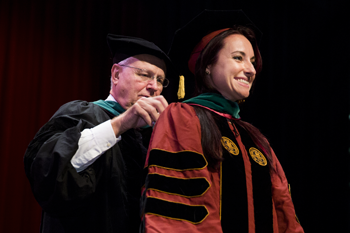
- Megan McDowell (Merritt Ryals Clements, M.D., Award for Excellence in Obstetrics and Gynecology)
- Mary O’Meara (Florida Geriatrics Society Award for Outstanding Student in Geriatrics)
- Ankita Patel (Clerkship Directors Psychiatry Award)
- James Pilkington (Student Research Award, Alpha Omega Alpha Honor Medical Society)
- Sweta Sengupta (Alpha Omega Alpha Honor Medical Society)
- Ann Sheddan (Excellence in Emergency Medicine Award, Regional Campus Dean’s Award (Fort Pierce), American Medical Women’s Association Glasgow-Rubin Achievement Citation, Alpha Omega Alpha Honor Medical Society, Gold Humanism Honor Society)
- Richard Sims (Gold Humanism Honor Society)
- Jessica Specht (Alpha Omega Alpha Honor Medical Society, Gold Humanism Honor Society)
- Colin Swigler (J. Ocie Harris Outstanding Student Award, Regional Campus Dean’s Award (Sarasota), Alpha Omega Alpha Honor Medical Society, Gold Humanism Honor Society)
- Brett Thomas (Myra M. Hurt Leadership in Medicine Award, Outstanding Graduate in Family Medicine Award, Florida Geriatrics Society Award for Outstanding Student in Geriatrics, Alpha Omega Alpha Honor Medical Society, Gold Humanism Honor Society)
- John Thomas (Gold Humanism Honor Society)
- Matthew Welsh (Excellence in Surgery Award, Regional Campus Dean’s Award (Orlando), Alpha Omega Alpha Honor Medical Society, Gold Humanism Honor Society)
- Zachary Williamson (Alpha Omega Alpha Honor Medical Society)
COMMENCEMENT ADDRESS
Lynn Romrell, Ph.D.
(FYI: He didn’t follow this written version exactly)
Some people refer to me as the “numbers guy.” Consider a few numbers.
• 1,443: That is the number of days that have passed since I began the journey with you, which culminates today with your graduation from the FSU College of Medicine.
• 133: That’s the number of exams, quizzes, NBME subject examinations, FOSCEs, OSCEs and USMLE step examinations you have taken in those 1,443 days.
After your first exam in Clinical Anatomy, I shared a story with you. I saw a documentary called “Touching the Void,” the true story of two British mountain climbers who were in their early twenties. It’s based on the book of the same name by Joe Simpson. He and Simon Yates shared a disastrous and near fatal climb on a 20,813-foot mountain in the Peruvian Andes in 1985.
Synopsis...
Both climbers successfully reached the summit of the previously unclimbed west face of the mountain, named Siula Grande. Joe was injured during the descent after falling, resulting in severe damage to his knee and multiple fractures of his tibia. The pair of climbers decided to lower Joe down the mountain with the help of two 150-foot ropes on the steep snowy slope, while an enormous storm raged on. Simon could not always see where he was lowering Joe, and Joe eventually dropped off a cliff and was suspended by the rope in midair. Simon stopped Joe’s fall, but he could not see the predicament of his partner nor could he hear him because of the severity of the storm. He was slowly being pulled down to the edge of the cliff.
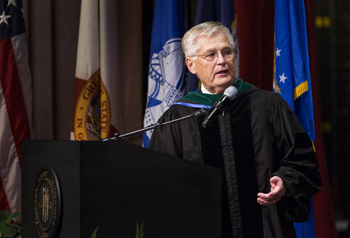 After about an hour, Simon realized that there was little chance of recovery from this situation for either of them and he made the decision to cut Joe’s rope. After surviving a subzero and stormy night on the mountain, Simon descended, but he could not find his partner. There was a deep crevasse at the bottom of the cliff. Simon decided his partner had fallen into the crevasse and was dead. He returned to the base camp alone, where he stayed a few days to recover.
After about an hour, Simon realized that there was little chance of recovery from this situation for either of them and he made the decision to cut Joe’s rope. After surviving a subzero and stormy night on the mountain, Simon descended, but he could not find his partner. There was a deep crevasse at the bottom of the cliff. Simon decided his partner had fallen into the crevasse and was dead. He returned to the base camp alone, where he stayed a few days to recover.
Joe survived the fall from the cliff and had landed on a ledge in the crevasse. He managed to lower himself further into the dark crevasse despite his broken leg and found an exit leading to the base of the mountain.
When Joe first looked at the situation he thought, “There’s no way I can drag myself the five miles down to the base camp. It’s impossible ... But I can drag myself to the next rock.” He then spent days crawling across glaciers and rocks with his broken leg and other injuries.
Delirious, he found and crawled into the climbers’ base camp the night before Simon planned to leave.
I shared with the Class of 2014 what I saw as the parallels to life and to medical school: If we think of the journey and all that must be done, it’s impossible. However ... we can make it to the next rock!!!
Take life a step at a time and focus on the next event.
• 1,003: That is the number of patient encounters you have recorded on average during the past four years.
An incredible number of people have shared their stories, sometimes pain and suffering, joys and frustrations, sometimes seeking your understanding and help. They have been instrumental in your education and training. It is an incredible number … but it is only the beginning. You will have many more people coming to you in the future. They have the right to expect your concern and care … your full focus when you give them of your time and care. [In 2011, the American Academy of Family Physicians reports an average of 99 patient visits per week to FPs (more than 4,600 patient visits per year) http://www.aafp.org/about/the-aafp/family-medicine-facts/table-6.html ].
In 300 B.C., the Greek physician and “Father of Anatomy,” Herophilus (335 to 280 B.C.), is reported to have said: “When health is absent, wisdom cannot reveal itself, art cannot become manifest, strength cannot fight, wealth becomes useless and intelligence cannot be applied.”
[He performed public dissections of human cadavers in Alexandria, Egypt; he reportedly “vivisected” at least 600 live prisoners. His work is considered to be founding work in anatomy. He is credited for working out the method for measuring a pulse. He identified cranial nerves including the optic and Oculomotor. He believed the brain was the center of the soul and believed that sensory and motor nerves “shot out from the brain.”]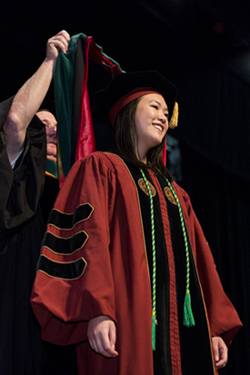
The famous Canadian physician Sir William Osler (1849-1919) frequently spoke and wrote about the relationship between the physician and patients. Osler was one of four founders of Johns Hopkins Hospital (1889). Four years later, he was instrumental in the creation of the Johns Hopkins University School of
Medicine and became one of the school’s first professors and chair of the Department of Medicine. Among the many quotations of Osler, I would like to share two quotations about his focus on the patient:
“He who studies medicine without books sails an uncharted sea, but he who studies medicine without
patients does not go to sea at all.”
“The good physician treats the disease; the great physician treats the patient who has the disease.”
Today’s “commencement” for the Class of 2014 marks the end of one journey and … the beginning of another. I would like to share three statements of advice with you:
- Take care of yourself (as you are told every time you travel on a plane … so you are ready to help others: “Put on your own oxygen mask first”). Prepare yourself: mentally, physically and intellectually.
- Give each patient (like the next rock) your full attention each time they come to you for help, advice and care.
- My dad taught me: “No success in life can make up for failure in the home.” My dad was a very good man and lived by his word. Never forget or neglect your family, friends and loved ones … . You did not make it to this day by yourself. You will also need these people as you move forward. Medicine and life are “team sports with lots of players.”
Congratulations. You have made it to a very big ROCK today … I wish you success as you continue your journey!
CLASS PRESIDENT’S ADDRESS
Brett A. Thomas, M.D.
Faculty, staff, Bridge graduates, our beloved family, friends and, last but certainly not least, the AMAZING Class of 2014: We made it!
I hope everyone in this auditorium today feels a sense of accomplishment, joy and thanksgiving, because in some unique way, you have played a role in the lives of the graduates you see before you. I can only imagine the emotions and thoughts that are streaming through Ruby Diamond right now. Certainly a mother, father or loved one is thinking or saying, “I’m so proud of him.” Or, “It was only by the grace of God that she’s graduating.” Or even, “Look at my baby up there on stage. He’s all grown up. My baby is a doctor!”
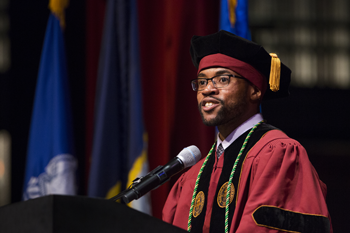 Traditionally, the class president has the opportunity to tell the story of the class, reflecting and reminiscing on the journey and offering pearls for the road ahead. I desire to accomplish that purpose this morning through the following scenario: If our journey could be a book, highlighting our experiences, what would be the title and content of each chapter? So, take a trip with me for a moment as we reflect on our story.
Traditionally, the class president has the opportunity to tell the story of the class, reflecting and reminiscing on the journey and offering pearls for the road ahead. I desire to accomplish that purpose this morning through the following scenario: If our journey could be a book, highlighting our experiences, what would be the title and content of each chapter? So, take a trip with me for a moment as we reflect on our story.
Chapter 1. “I Don’t Want No Scrubs, Because They Smell Like Formaldehyde”: The Journey Through Anatomy and Other Basic Science Courses
It wouldn’t be medical school if we didn’t take a trip back to the Anatomy Lab. This is the place where we met our “first patients,” established our first friendships and a few even got our first dates. (You know who you are.) Dr. Romrell appropriately began the summer by reading letters from the families of the deceased patients whose cadavers taught us so much. The letters described their occupations, memories, dreams, fears … and a charge to our class to use this course to study the complexities and beauty of their body.
This was no small task considering all the nerves, arteries, muscles and even embryological tissue origins we had to learn. Fortunately, our teaching assistants handed down to us classic mnemonics and other phrases that have helped med students remember anatomy through the ages. Who could ever forget “Tell Ziggy Bob Marley Called” for the facial nerve branches? Or Dr. Romrell’s favorite one from lecture: “S2, S3, S4” keeps the… I’ll let you fill in the rest of that one, class.
Countless hours and thousands of bold terms later, we retired our scrubs and embarked on other basic science courses where we learned the foundation of medicine. On the lighter side, Dr. Ouimet taught us it was always possible to identify “where’s the lesion” when the life of an innocent puppy was at stake. Fortunately, we didn’t have too many casualties. We learned from Dr. Levenson that all things are possible with the sympathetic nervous system. Even lifting your heavy microwave filled with the aroma of burnt popcorn and placing it on the roof. That will never get old.
Dr. Jake showed us that macrophages look and function a lot like PacMan in various places in the body. We learned in embryology that, when in doubt, the answer is “neural crest cells.” In microbiology, we learned that nothing is safe to eat or touch because of microbes, especially Aunt Mae’s potato salad at the picnic or Uncle Bob’s medium-rare hamburger at the BBQ. (Sorry if anyone made that for a graduation party dish.) As you can tell, in addition to giving us a great foundation, our professors also gave us jovial memories to cherish.
Chapter 2. The “CHAD”: Friendships, Intramurals, T-shirts and All the Other Fun Times in Medical School
Contrary to popular belief, medical students’ noses are not always buried in books. Drs. Painter and Porter, our counseling support staff, always emphasized the importance of balance in this marathon we call medical school. You could find us many nights on the intramural fields. Who could ever forget the epic football game between the Doc Jocks and MedHeads? Actually, I can’t quite remember who won that game. Whatever team Tony Herzog was on, right?
We also spent many weekends tailgating during Nole football season. You always knew you were at a College of Medicine tailgate by seeing some of us who had the audacity to wear our orange-and-blue FSUCOM shirts. Speaking of T-shirts … a few of us were so “inspirational” that we got our face on one.
We danced the night away at Gala, participated in numerous events through interest groups and even battled it out for the title of “Best LC Alive” and the Golden Stethoscope award through the LC Olympics. Congratulations again to LC 3190, but in defense of the other LCs, how could we ever beat you in tug-of-war when you had Jim Hughes, aka the Hulk, on your team?
Chapter 3. Is There Anything Else? Actually, There Is — a Lot More: From the CLC to the Clerkship Years
After two years of training with standardized patients and some preceptorship experience, we began our journey in various clerkships. In the words of Dr. Granville, our toolkit was full. We could perform a complete, head-to-toe physical exam in 50 minutes or less, and wash our hands longer and more meticulously than any other medical student in the nation. We were ready. We delivered babies, counseled individuals on smoking cessation and got to do more than hold the retractor in surgery. We were on top of the world.
.png) Memorizing checklists quickly evolved into our playing a pivotal role on the medical team. And many of our simulated small-group sessions on breaking bad news actually manifested as real-life scenarios. Some of us had to deliver news of the dreaded “C-word,” cancer, to a patient for the first time. And even as we experienced the miracle and wonder of delivering babies on OB, some of us also encountered the sorrow of informing an expectant mother that there was no longer a fetal heartbeat … and her ultrasound confirming a miscarriage.
Memorizing checklists quickly evolved into our playing a pivotal role on the medical team. And many of our simulated small-group sessions on breaking bad news actually manifested as real-life scenarios. Some of us had to deliver news of the dreaded “C-word,” cancer, to a patient for the first time. And even as we experienced the miracle and wonder of delivering babies on OB, some of us also encountered the sorrow of informing an expectant mother that there was no longer a fetal heartbeat … and her ultrasound confirming a miscarriage.
We ultimately learned that a “good pathological case” always came with a price. Sometimes it was a left-behind elderly spouse or a stroke survivor, once a social butterfly, now unable to speak. Somewhere during our third and fourth years, we began to understand the weight of the responsibility we’d soon be carrying. But if not for these experiences, we wouldn’t have received clarity on our specialty choice, met our match or gained the experience to care for our future patients. We will be forever grateful.
Chapter 4. “This, Too Shall Pass”: Persevering Through the Storms of Medical School
One of the most challenging things about medical school is that we are not immune to the unforeseen circumstances of life. We’ve experienced many hardships, even the passing of friends and family during our medical training. Some of us have battled medical illnesses of our own, really understanding what it means to be a patient. Factor that in with the demands of eight-hour board exams, meeting the expectations of preceptors and needing to be emotionally and cognitively available for every patient, and the load sometimes felt too heavy to bear. Until someone else came along.
In addition to the wonderful support we’ve received from our guests today, we’ve received an infinite amount of encouragement from the faculty, staff and counseling services at the College of Medicine. There was nothing like a conversation with Hanna over a slice of monkey bread to lift your spirits, or a nice big hug from Mama K to brighten your day.
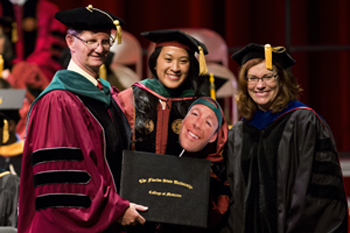 We often extended a hand to a classmate in need. As president, I always had students approaching me about organizing ways to send cards or flowers, or attend memorial services and funerals, just to walk through the storm with a peer. Recently, many of you sent love and support to our classmate Jimmy Westbrook, after he and his family lost many items to flooding in Pensacola. We truly became family and couldn’t have done it without each
We often extended a hand to a classmate in need. As president, I always had students approaching me about organizing ways to send cards or flowers, or attend memorial services and funerals, just to walk through the storm with a peer. Recently, many of you sent love and support to our classmate Jimmy Westbrook, after he and his family lost many items to flooding in Pensacola. We truly became family and couldn’t have done it without each
other — and, of course, the wonderful support systems here today. To my classmates who did lose a loved one, I know they would be so proud of you today.
Chapter 5.
The final chapter has no title. This is the chapter I’ve left blank for you, Class of 2014. Graduating today is a tremendous milestone, and I’m so proud of us, but we know this is
just the beginning. And as we write our story for the road ahead, I ask that we keep these
last two thoughts in mind:
- Don’t compromise your patient-centered values. The health-care system is changing. Some say for the worse, and others for the better. But one thing that doesn’t have to change is our commitment to fighting for rural, underserved, minority and geriatric populations. I hope to continue to hear stories of your accomplishments in medical missions, stories of your health drives to bring care to indigent communities. Although there are many factors that led us to the College of Medicine, I know a common trait is that we want to deliver the best-quality care possible and have it available to all. Thank you, class, for your current efforts, and let’s continue to do the right thing.
- Keep each other encouraged. Although the profession of medicine is rewarding, it is also demanding. Not only have we received numerous lectures on physician burnout, we’ve also encountered physicians who have lost the joy of being a provider because of bureaucratic challenges. I hope we can retain the belief that being a physician is one of the best privileges, blessings and professions imaginable.
Class of 2014, it’s been a pleasure serving as your president. I hope, wish and pray that you realize your purpose and calling. And thanks, College of Medicine, for giving us a wonderful four years.

